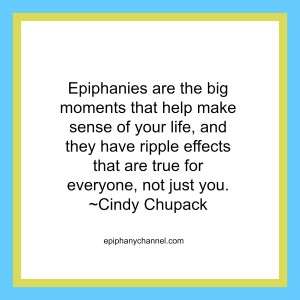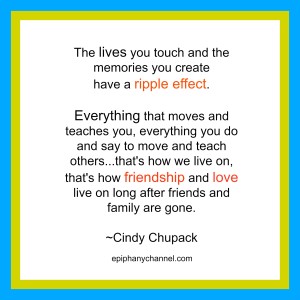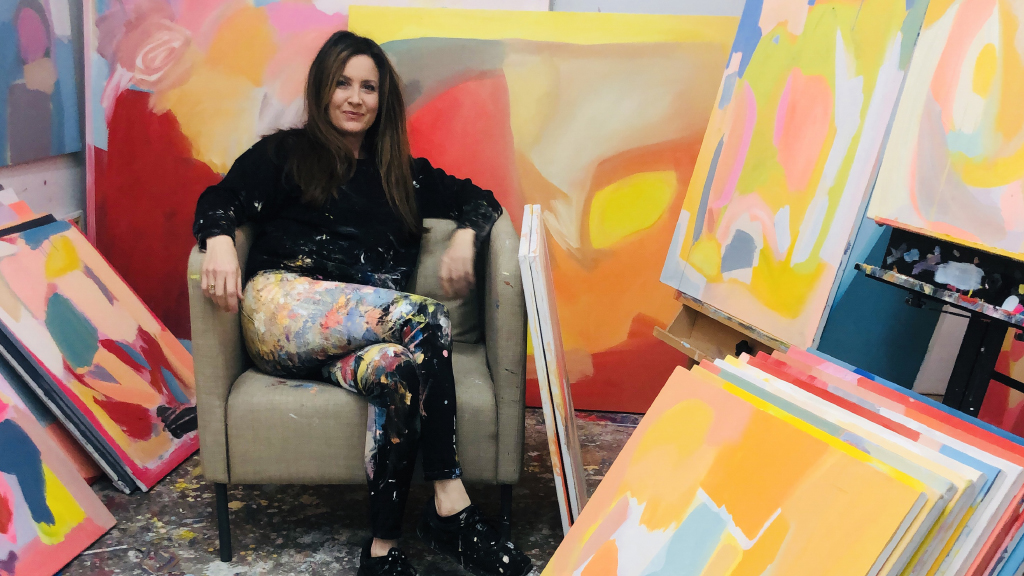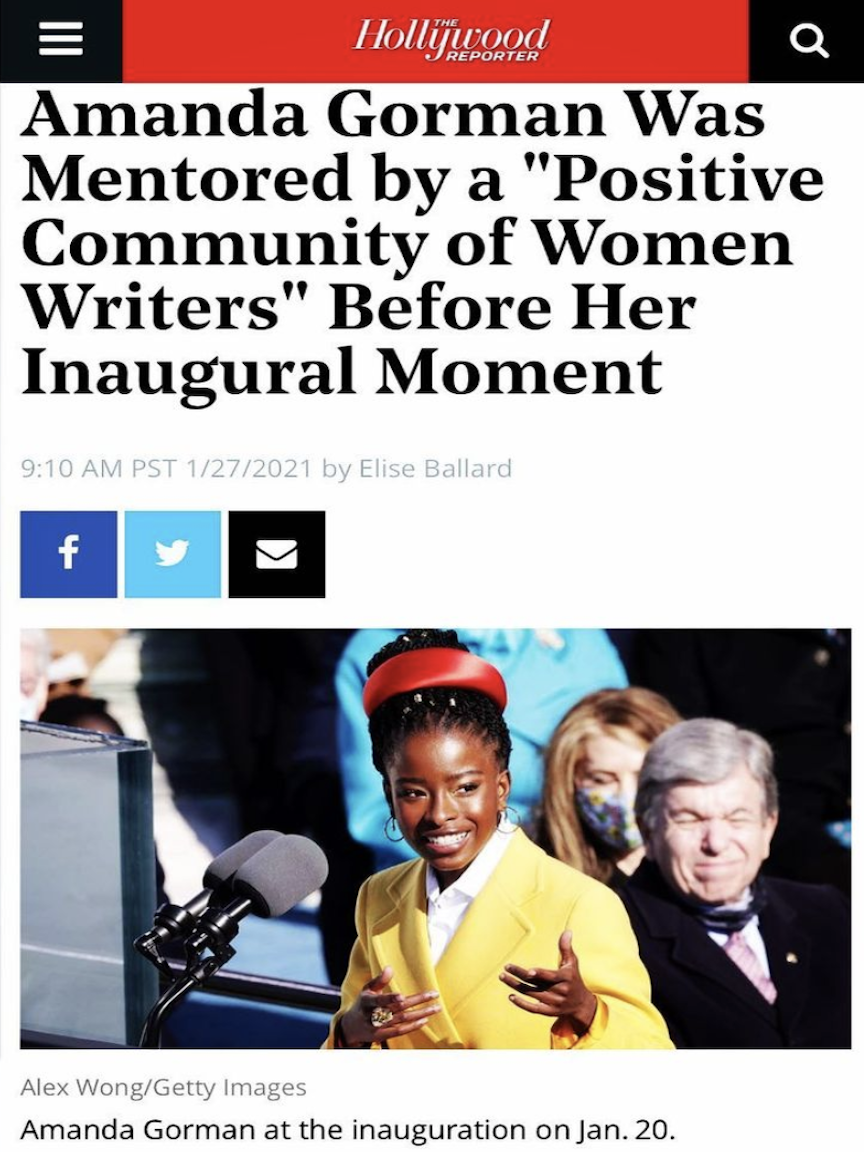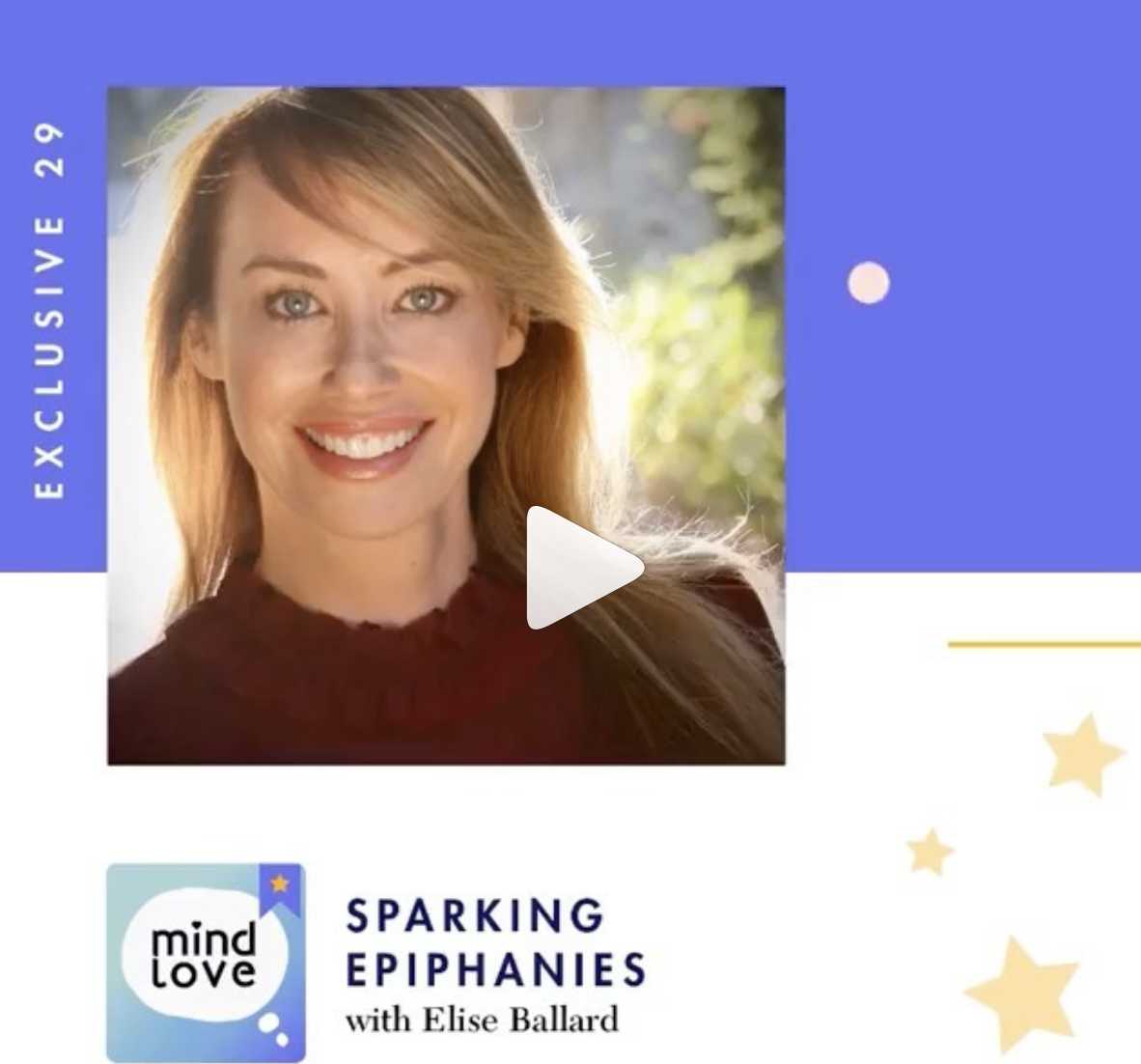As promised, here is the second part of my interview with the award-winning writer, Cindy Chupack.
Just in case you missed Part One (don’t miss out, you’ll love it!), below is a little about her and then you can read on to experience more of her epiphanies about writing still being a meritocracy (Fellow Writers, you’ll really love this one), losing a loved one and how to go on, and finally, a Q&A that contains an epiphany about never telling the same story twice – EVER. (Yes, supposedly, this IS possible according to Buck Henry – who is now on my wish list of “People To Interview.”)
Plus, (and this will be exclusive to EpiphanyChannel) see whose epiphanies Cindy would like to know about and why, and more epiphanous tidbits. So without further ado…
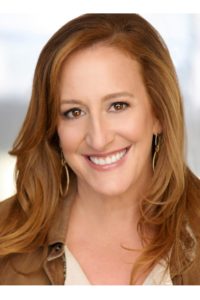
***
Cindy Chupack is best known as an Emmy-winning TV writer/producer whose creditsinclude Modern Family, Sex and the City, and Everybody Loves Raymond. Author of New York Times bestseller “The Between Boyfriends Book,” her new comic memoir about marriage “The Longest Date: Life as a Wife” was released by Viking in January 2014 and just became available in paperback.
***
CINDY CHUPACK’S EPIPHANIES and THEN SOME…
as told to ELISE BALLARD
WRITING
“Writing is still a meritocracy.
Great writing will always open doors and will find its way to the right people.” ~Cindy Chupack
I didn’t know anyone when I sent my first piece into a magazine.
When I moved to New York there was this magazine called New York Woman that I always read and loved. It doesn’t even exist anymore, but there was always a last page, first-person essay, and it was always in straightforward, plain English, really funny and always smart. I wrote a piece about New York and sent it in to them, and my boyfriend at the time said, “Don’t be disappointed if they don’t publish it. A lot of people try to write about New York, and you’re a girl from Oklahoma.” But I had a good feeling about it, which is unusual because I’m a very insecure writer, but I just felt like I knew their kind of writing and I felt good about this piece. I wrote it overnight and then sent it off – not that it usually comes that easily, but I just have a lot to say about New York.
That piece started everything for me, because New York Woman did publish it, and a comedy writer saw it and asked me to think about sitcom writing, and then a magazine editor saw it and asked me to think about writing for magazines. The essay is in my first book, Between Boyfriends and is called The “Real” New York Marathon. This one little piece that I wrote in my voice (even though I didn’t know what that even was at that point), with my sense of humor and my take on New York, got me noticed and started my writing career.
Once I met someone who came up to me and said, “Oh, my gosh. That piece, that New York Woman piece…” – she had it on her refrigerator! Which for me, was bigger than a Nobel Prize. My magazine piece was on someone’s refrigerator, someone who didn’t know me. She just read it and loved it and put it on her refrigerator. That made me so happy.
After that, when I was called by editors to pitch new ideas, rather than get crazy trying to figure out what the magazine wanted, or what should I write, I would just think about the stories I’d been telling my friends and ask myself, “What are the funny stories I have going on right now?” because that’s what I’d done with this piece.
Then later, whenever I got stuck I began asking, “What would I write to Marie?” Marie is one of my best friends and former college roommates and whenever I write her emails or even talk to her on the phone and tell her stories, she just gets and loves me, and she always laughs. I always tell her my stories in the funniest way, because I know she’ll love certain details, so when I’m stuck in an essay, instead of thinking of the wide audience, or the magazine editor, or whoever it is I’m writing it for, I just imagine I’m writing to Marie. So a writing epiphany for me, and advice I give to other writers is: “Find your Marie.”
Even though things started happening after my New York Woman essay was published, it wasn’t like I was in huge demand and had a booming career. I moved to LA and began taking screenwriting classes at UCLA Extension, and I was up for a job reading spec sitcom scripts for Disney TV Animation. They tested me to see if I knew how to read a script and do coverage on it, but of course, I had no idea what I was doing. So they didn’t hire me, but they had this big pile of scripts they were way behind on, so I offered to just try to read them and give coverage until they found someone. They were desperate so they let me do it and after reading them for a while, I started to learn what made a good script and what didn’t.
This really changed the way I looked at Hollywood, because I wanted each script I read to be good. And when it was good, when it was really good, I’d get excited to share it with people and would pass it on, completely confident. I saw the difference between a good script and a great script. A great script takes on a life of its own and it starts traveling around. A great read is like a great song – people want to share it and it spreads.
This process made me feel that, even though I was a girl from Oklahoma, it didn’t matter – that at the end of every script pile and at every agency that is looking for a script and at every production company — if the writing is great, it will find its way to the right person and open doors and find a path for you. I don’t know how many writers feel that way, but I feel at its core, writing is still a meritocracy.
Writing in general – whether it’s scripts or books or magazines – if you are writing things that are true to you, it will find a path and open doors for you, so put something out in the world that’s true to you. Take some risks. Your work will find its way to the people that will hear you.
***
LOVE, FRIENDSHIP, IMMORTALITY + THE RIPPLE EFFECT
“The lives you touch and the memories you create have a ripple effect. Everything that moves and teaches you, everything you do and say to move and teach others… that’s how we live on, and that’s how friendship and love live on after friends and family are gone.”
~Cindy Chupack
My friend Padma, who was a dear, dear friend, died from a very rare form of cancer at age thirty-three several years ago. Padma was so positive, and I was so positive when I was with her. I mentored her, but she also mentored me. She was such a cheerleader for me when I needed it, and I still need it a lot. It’s hard to find someone who is fully happy for you, but Padma was one of those friends.
She and I used to go to yoga and spinning every Sunday. Whenever I go to yoga now, I feel like I can talk to her. I’ve had a lot of strange conversations in my head with her.
For example, the other day we were doing that upside down pose in yoga, the anti-aging pose, and she said, “You know what’s anti-aging? Cancer!”
It was as if I’d heard her say it – the thought was in her voice and funny, like she was. It was something I’d never considered before: Why are we always so upset about aging? Aging means we are still here!
Recently I felt overwhelmed with work and wondered how I was going to do it all — which project should I bet on, how will it all get done? And Padma said, “Just water everything.” This really helped me. All I have to do every day is “water” everything, see what grows and trust… and that’s what I’ve been doing.
I have said to Padma in these kinds of moments, “Am I really talking to you, or is this what I think you would say to me, because I knew you so well, and I’ve missed you so much?” I felt like I heard her say, “Does it matter?”
And I realized, it doesn’t matter, does it? If you love someone enough, and they’ve made such an impression on you that you feel like you can have a conversation and hear them after they’re gone – the love, information, and wisdom that comes to you through that relationship is the same – it’s just as good, just as valid. I feel lucky to have had Padma in my life, because I still have her in my life and always will.
I remember when I was growing up, wondering about the afterlife. Is there an afterlife? Is there heaven and hell? There was a sense in Judaism that the lives you touch and the memories you create have a ripple effect. That seemed like not enough to me at the time, but now, as I get older, I feel the ripple effect. Everything that moves you and teaches you, everything you do and say to move and teach others… that’s how we live on, and that’s how friendship and love lives on after friends and family are gone.
***
Q &A EPIPHANY: THE HIGH-OCTANE OBSERVER AND WORKING MIND
“It is possible to never tell a story twice (?).
(We Can’t All Be Buck Henry—But We Can Try).” ~Cindy Chupack
In my book, The Longest Date: Life as a Wife, I talk about how my husband and I noticed we tell the same stories to people over and over again – you know, “your “go-to-get-to-know-me” stories and how they start grating on you when you’ve heard them a million times, and it made me think about what the director Mike Nichols said to me. He was going to maybe direct a movie of mine so we were working together, and he told me that Buck Henry never repeats an anecdote.
Elise: What? In his whole life?
In his whole life – that’s what Mike Nichols said. [laughs]
Elise: How is that possible?
I don’t know, but I saw Mike again months later. We were talking about something and he told me, “Did you know that Buck Henry never repeats an anecdote?” I kind of looked at him and he realized, “I’ve told you this before?”
“Yes.”
And he goes, “And scene!” [laughs] And now, I’m repeating this anecdote to you. But it’s astounding to me. When I was trying to do stand-up, I had maybe five minutes, and I was working my material over and over. And even now with my book, I read the essays that I’ve written time and again, but some people go out there and read new stuff, and try new stuff all the time. Those are the people I really admire – the ones who are gathering and observing, are super-present to life and are exploring new material and information all the time. They aren’t always revisiting something they know works or a story they know people will laugh at.
It’s a high bar. We can’t all be Buck Henry, but it did make me think, “Wow, that’s a working mind.” I always dream of being that person who only speaks up a little and when I do speak up, it’s profound. But every day, I’m like, “Oh, I already said too much to do that today.”
Elise: Whose epiphany you would want to know if you could ask anyone in the world?
I feel I need to know Buck Henry’s epiphany now! [laughs]
Michael Patrick King. He ran Sex and the City. Even though I get to talk to him a lot and have had lots of conversations with him, I’ve never had that conversation with him. I feel like his answer to this question would be fascinating. He’s someone I admire, he’s an amazing storyteller, so wise and creative, and just such a lovely soul that I would be very interested to know what he felt were the epiphany moments in his life.
I would love to know Obama’s or Michelle Obama’s epiphany.
Do you know Steve Earle the songwriter? He’s Texan and writes beautiful, sad songs. He’s been in jail, is a great artist, and there is such a deep sadness to his writing, so I’d be curious about his epiphany.
David Sedaris, because he’s so funny all the time. I would be interested to hear a real epiphany of his. I know he has one. He’s deep as well as funny.
I’d love to know Anne LaMott’s. She has a lot and has written about some of them and I love what she has to say.
Elise: Those are all amazing. Thank you – they will all go on the Epiphany Wish List. What is coming up for you? Is there anything you want us to be looking out for?
Well, the paperback of my book came out December 2014. I am also hoping in 2015 to direct my first film – it’s the film adaptation of a book by William Sutcliffe called Whatever Makes You Happy, and we have a great cast assembled, but it’s like, “Just water it.” That’s my motto. [laughs] I’ve been watering it for a while, and I’m hoping it happens.
Elise: You would be a great director — you really understand story, and you know performing.
I hope so. I feel I am ready. I will say, after having a child, something happened with me where I feel a little more fearless now.
Elise: You’ve always been brave from what I can tell. “I’m going to send this off and no one knows me. I’m going to ask for this job, and read scripts I have no idea how to evaluate. I’m going to write for television, I’ve never done it.” But you’ve always just jumped in. You’ve always gone for it.
I guess, in hindsight, but I still don’t feel brave. At least as far as writers go, I feel the closest kinship with writers who are insecure, because I always feel insecure. And whenever someone tells me, “I wrote this thing, it’s so great, you’ve got to read it.” It’s like, “Really? I’ve written a lot, and never feel like it’s great.” I never know for sure if something’s great, so I would never just say that like that. [laughs]
Elise: Oh, good. I’m so glad you’re like that too, because I always think about anything I write, “This is horrible. I still need to keep editing it.” I never feel like it’s finished. So that’s normal?
That’s normal and healthy, and very positive. I think all writers are insecure. [laughs] Or should be.
***
Behind-the-Scenes of The Interview
I met Cindy when she was moderating of a panel of women television comedy writers for the Writers Guild Foundation and HUMANITAS in Los Angeles. (She is on the Board of Trustees for HUMANITAS and I am one of the judges for the HUMANITAS prize.) I knew of her because of Sex and the City and loved her first book, Between Boyfriends, but she’s one of those people who is even better and more full of light than you’d anticipated when you see her in action and meet her in person.
We met in the apartment that she uses as an office in Marina del Rey – gotta love that she likes to write on a laptop on a bed – and talked for over an hour. She is one of, if not the, most prepared subjects I’ve ever interviewed, and our conversation ranged from epiphanies to childhood, career, Sex and the City, therapy, marriage, fertility, adoption, non-profits, her latest book (which is hilarious and poignant, in my opinion), and finally Buck Henry. Learn more about Cindy at her info-filled, one-page website www.CindyChupack.com and at www.facebook.com/CindyChupack.

